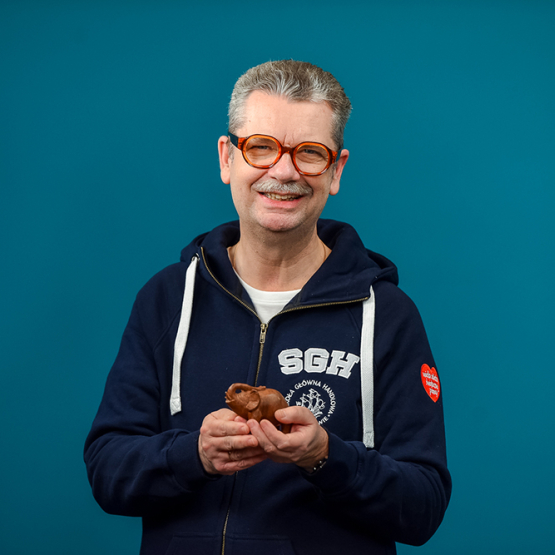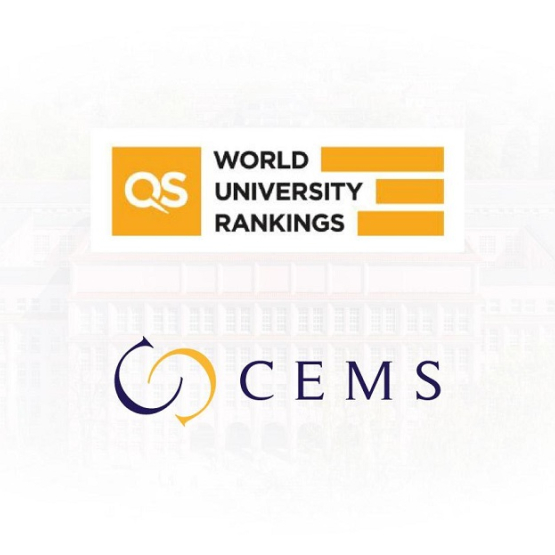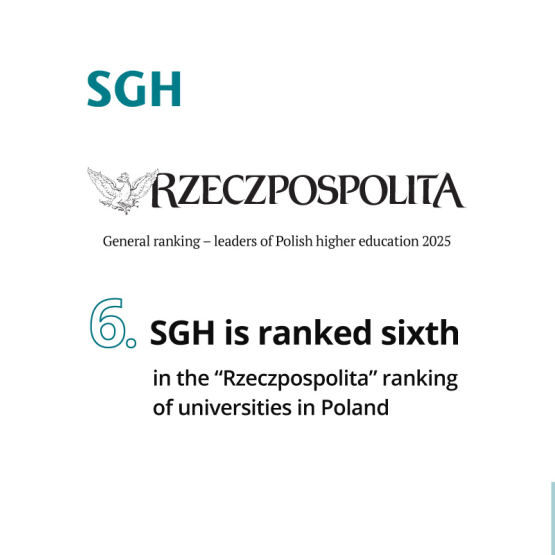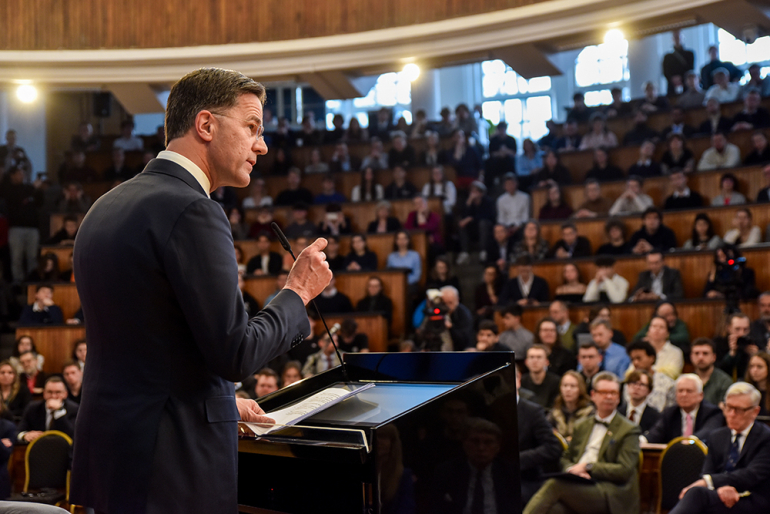
On 26 March 2025, the University authorities, experts and students met Mark Rutte, NATO Secretary General, former Prime Minister of the Netherlands, in 2010-2024, at the SGH Warsaw School of Economics.
The NATO Secretary General first met the Rector-Chancellor authorities. In the office of the Rector of the SGH Warsaw School of Economics, he signed his name in the commemorative book. Among the people welcoming the Secretary General at SGH was also Warsaw Mayor Rafał Trzaskowski, who had a short conversation with him. Then, in the Main Auditorium, the NATO Secretary General gave a speech entitled Stronger NATO. Commitment to Euro-Atlantic Security (see the full text of the speech below). After the speech, as part of the Q&A session moderated by Director of the Polish Institute of International Affairs (PISM) Dr. Jarosław Ćwiek-Karpowicz, Mark Rutte answered questions asked by students and experts. The next item on the agenda was a press briefing for representatives of several editorial offices – Polish and foreign. The event was organised in cooperation with PISM.
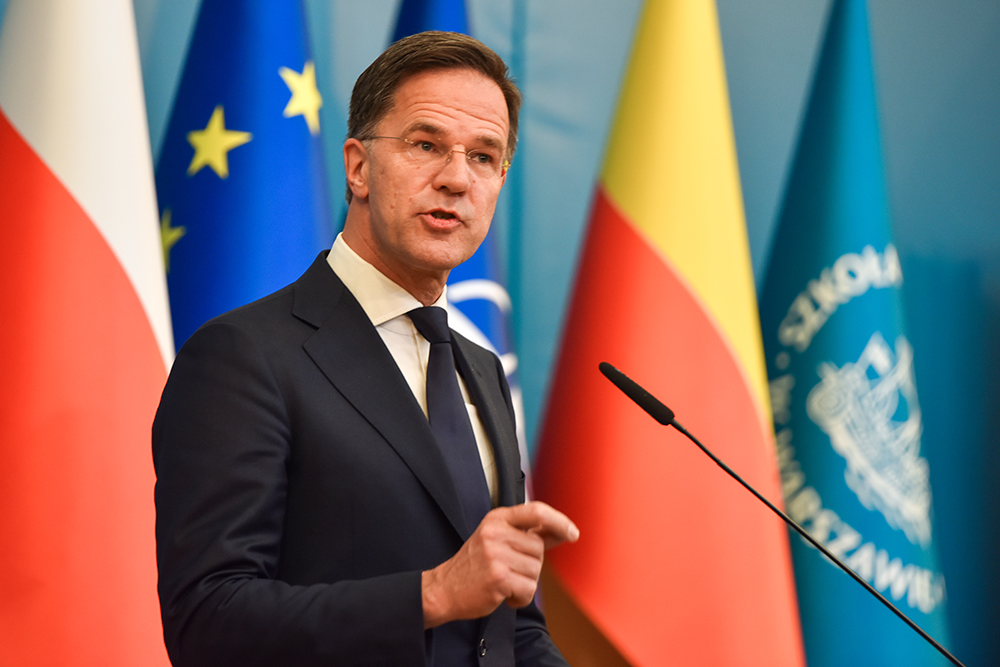
Mark Rutte
“Thank you. It’s great to be back in Warsaw. And to see everyone here in the room and following online.
In my first speech as Secretary General in December, I said I wanted to start a conversation with the one billion people living in NATO countries about our security. And what better place to continue that conversation than here in Poland? You are truly a leader on defence, spending 4.7 percent of GDP this year. You are a strong supporter of Ukraine. And Poland has put security at the heart of your EU Presidency.
In my meetings earlier today, I thanked President Duda and Prime Minister Tusk. Not just for talking the talk, but for walking the walk, when it comes to our security. Now, I want to take some time with all of you. To address some of the questions about the strength of the transatlantic bond. And to sketch out the path to our NATO Summit in The Hague in June, following my recent discussions in Washington with President Trump.
I know that things have been moving fast in recent months. And many of us feel less secure in this rapidly changing world. Russia’s war against Ukraine is raging on. And there are concerns about how it will end. However it ends, Russia will remain the most significant and direct threat to our security. Russia is ramping up its defence spending. And it is rapidly rebuilding its armed forces. Built on Chinese technology. Backed by deadly Iranian drones. And North Korean troops and missiles. Putin has not given up his ambition to reshape the global security order. And he is not alone. China, Russia, Iran and North Korea are increasing their military cooperation and exercises. Beijing is carrying out its own massive military build-up. Including its nuclear forces, with no limits or transparency.
What’s happening in Europe matters for the Indo-Pacific. Securing lasting peace for Ukraine is essential for European security. And for global stability. The world is watching. I welcome that President Trump has broken the deadlock with Russia. And that talks are ongoing towards a ceasefire.
I also welcome that the UK and France are leading efforts to contribute a lasting peace, which we will discuss in Paris tomorrow (March 27). At the same time, I know there are questions about the strength of the transatlantic bond. And the United States’ commitment to European security.
There is tough rhetoric. There are difficult debates between Europe and America over trade and tariffs. And there are calls to revive ideas of European autonomy. Let me be absolutely clear, this is not the time to go it alone. Not for Europe or North America. The global security challenges are too great for any of us to face on our own.
When it comes to keeping Europe and North America safe, there is no alternative to NATO. Without the US, UK, Canada, Norway, Iceland, and Türkiye, it is impossible to imagine the defence of Europe. And nothing can replace America’s nuclear umbrella, the ultimate guarantor of our security. A strong transatlantic Alliance remains the bedrock of our defence. And stronger European Allies are a unique strategic asset, which allows the US to promote peace through strength on the global stage. When it comes to security and defence, I am absolutely confident that the United States remains committed to NATO and to Article 5.
Don’t just take my word for it. Listen to President Trump who has repeatedly stated his commitment to a strong NATO. Listen to the strong bipartisan support in the US Congress. And listen to the American people, three-quarters of whom support NATO according to a recent poll. I heard this again myself in meetings in the White House and on Capitol Hill two weeks ago. And it’s not only about words, but also about actions. US troops lead our NATO forces here in Poland. American strategic bombers patrol European skies. And US aircraft carriers send a message of strength at sea.
Yes, Europe needs to know that Uncle Sam still has our back. But America also needs to know that its NATO Allies will step up. Without restrictions and without capability gaps. It’s only fair. Reassurance is a two-way street. The US commitment to NATO comes with a clear expectation. That European Allies and Canada take more responsibility for our shared security.
So, at our Summit in The Hague, we will begin a new chapter for our transatlantic Alliance. Where we build a stronger, fairer and more lethal NATO. To face a more dangerous world. A stronger NATO means investing and producing even more for our defence. A fairer NATO means all Allies doing their fair share. And a more lethal NATO means that, whilst we will always remain a defensive Alliance, we will always be ready and able to do what it takes to stay safe. When it comes to spending more, European Allies and Canada have stepped up with huge new investments. Last year alone, they increased defence spending by 20 percent. And over the last decade, they added an extra 700 billion for defence.
Almost all Allies are now spending two percent of GDP on defence. And many have pledged to go even further and faster. Poland is leading the way, alongside Estonia, Latvia and Lithuania, moving to five percent in the coming years. The German parliament has unlocked more than a trillion in extra defence and infrastructure spending. Czechia, Denmark, France, Norway, and the UK, have committed to considerably ramp up spending. And the European Union only last week came out with an initiative to free up to 800 billion for defence. All of this is nothing short of a sea-change for NATO’s collective defence.
When it comes to producing more, there are also good examples. Europe and North America are now producing millions of rounds of 155-milimetre shells. New gunpowder and TNT factories are being built across the Alliance, from France to Finland. And there are more fifth generation fighters flying in the Alliance skies than ever before. We are also producing more together. Take the F-35, which combines American ingenuity with British knowhow, Italian finesse and Dutch technical expertise.
European companies are supporting ammunition production, from Texas to Florida. And the US and Europe are building a new Patriot missile factory in Bavaria, in Germany. This is the kind of industrial win-win we need more of, not less of. This is how we rebuild our industry, together. And this is how we create good jobs and growth, on both sides of the Atlantic. There are so many opportunities to boost our transatlantic defence industry even more. There are hundreds of billions of extra euros and dollars to go around.
Finally, European Allies and Canada are also doing more for our shared security through NATO. They lead seven of our eight multinational deployments on our eastern flank. An Italian Commander leads NATO’s peace-keeping mission in Kosovo. A Dutch Commander leads our training and advisory mission in Iraq. And European Allies lead on NATO air policing over Iceland, the Western Balkans, and the Baltics.
When undersea infrastructure in the Baltic Sea was threatened this winter, European Allies stood up in record time through NATO’s Baltic Sentry. Without the need for a single US ship. European Allies and Canada are also playing a bigger role in Ukraine, as President Trump rightly asked them to. Last year, they provided 60 percent of NATO’s military aid to Ukraine. NATO’s command in Germany is now coordinating security assistance and training for Ukraine. With logistics hubs, including here in Poland. And Poland also hosts NATO’s Joint Analysis Training and Education Centre. A joint initiative with Ukraine to capture important lessons and innovations from this terrible war.
Over the last decade, NATO has carried out a generational transformation of our Alliance. We have significantly increased our presence on our eastern flank. Invested in new capabilities and military infrastructure. And revitalised our defence industry. Backed by large-scale exercises to demonstrate our commitment to each other’s defence. At our Summit in The Hague, we will do even more to ensure all Allies do their fair share. Based on ambitious new targets for all NATO Allies. Strengthening our capabilities, readiness and deterrence. Including air and missile defence, long-range missiles, and more ground forces. This will enable Europeans to take on a greater share of our collective defence, while maintaining strong American commitment and presence in Europe.
So we know what we need to do to stay safe today. And strong tomorrow. We know exactly what forces, resources, and capabilities every Ally needs to provide. And we have the plans and procedures in place to defend our own nations and support Ukraine. NATO Allies represent half of the world’s economic and military might. Two continents, 32 nations, and one billion people.
Together in NATO, Europe and North America are unbeatable. Today and in the future. So, to our one billion people I say this. Be assured. The transatlantic bond is strong. And, yes, we will make NATO a stronger, fairer, and more lethal Alliance. That is how we all stay safe in a more dangerous world. So, thank you and I look forward to our discussion.”
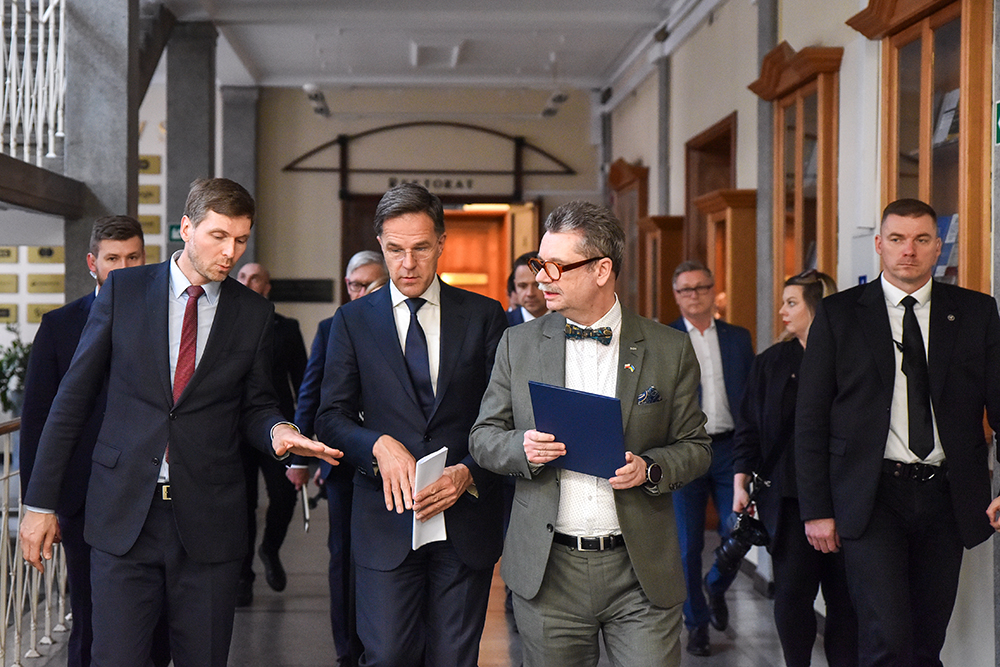
Jarosław Ćwiek-Karpowicz, Mark Rutte, Piotr Wachowiak head from the Rector's Office to the Main Auditorium for the NATO Secretary General's meeting with the SGH community
Mark Rutte took office as the North Atlantic Treaty Organization’s 14th Secretary General on 1 October 2024. As a former Prime Minister of the Netherlands Mr Rutte has a distinguished record of domestic and international achievements including security, defence, employment and social affairs, and economics. He is a strong supporter of global and transatlantic cooperation.
He joined NATO following a distinguished domestic and international career. Mr Rutte served as Prime Minister of the Netherlands for almost 14 years from October 2010 to July 2024. During this time, he presided over four coalition governments, proving his ability to forge consensus without compromising on his values.
Mr Rutte is the longest-serving Dutch Prime Minister to date. During his tenure, he steered the Netherlands through times of significant national and global upheaval, including the economic crisis, the coronavirus pandemic, and the war in Ukraine. He is a committed European and transatlanticist and was instrumental in bolstering his country’s role at the heart of NATO and the European Union.
The downing of Malaysia Airlines Flight 17 (MH17) by Russian-backed forces over Eastern Ukraine in 2014 marked a turning point in Mr Rutte’s premiership. It cemented his belief that no country can respond to today’s interconnected security threats alone: we are stronger together.
He was a member of the Dutch parliament from January to May 2003 and leader of the liberal Dutch People’s Party for Freedom and Democracy (VVD) from 2006 to 2023. He led his party to election victory in 2010, becoming the first liberal Prime Minister to be appointed in the Netherlands in 92 years.
Mr Rutte started his professional career in the private sector in 1992, working in human resources management for Unilever and its subsidiaries. He studied Dutch history at Leiden University and has been a guest teacher at the Johan de Witt group of schools in The Hague since 2008.
Source: NATO
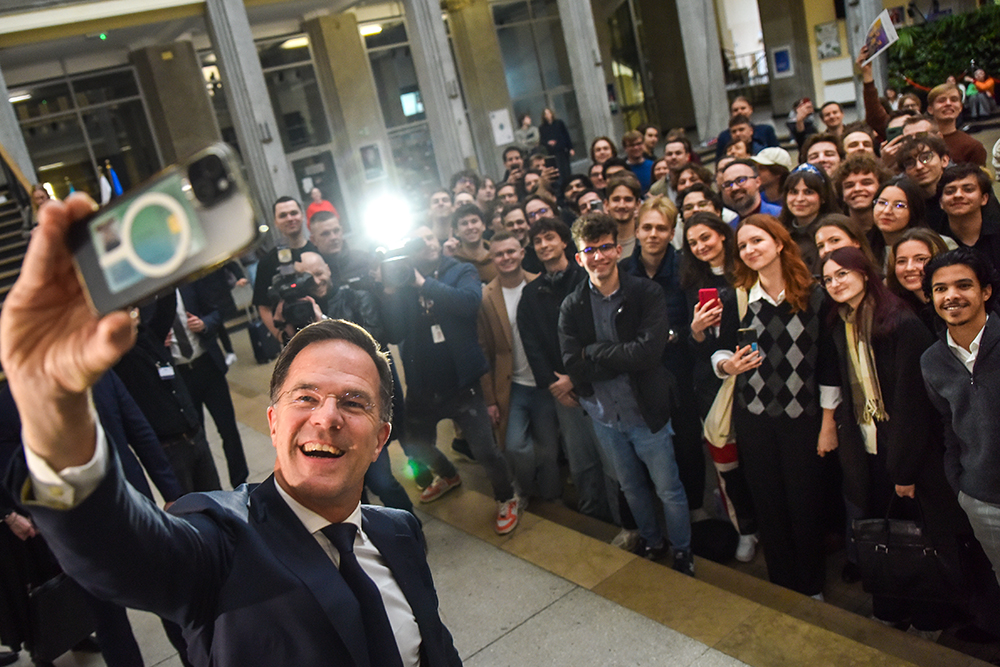
The NATO Secretary General was warmly greeted by SGH students, who took selfies with him. Some of the audience watched the meeting on the screen in the Main Hall, as the Main Auditorium had already run out of seats
PHOTO: PIOTR POTAPOWICZ, SGH

